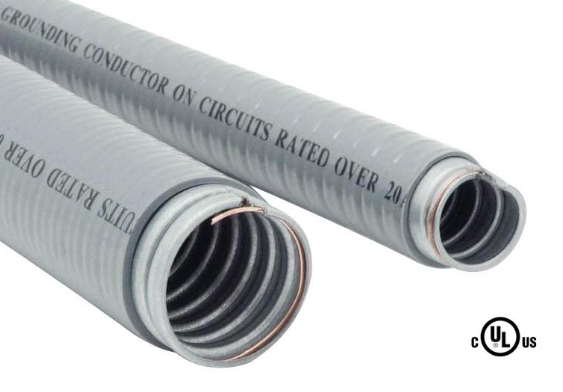Oct. 26, 2023
Two commonly used types of conduits are liquid-tight flexible conduit and metal conduit. Each has its own set of advantages and disadvantages, making them suitable for specific applications. In this guide, we'll explore the key differences between these two types of conduits to help you make an informed choice for your electrical and construction needs.
Liquid-Tight Flexible Conduit
Liquid-tight flexible conduit, often referred to simply as "liquid-tight conduit," is a type of conduit that is designed to provide protection for electrical wiring and cables in environments where moisture, liquids, or dust are present. It is a flexible conduit, which means it can be bent and routed more easily than rigid metal conduits. Here are some key characteristics and applications of liquid-tight flexible conduit:

Characteristics of Liquid-Tight Flexible Conduit:
1. Flexible and Bendable: Liquid-tight flexible conduit is made of materials like PVC, thermoplastic rubber, or other flexible polymers. This flexibility allows it to be easily routed around obstacles and through tight spaces, making it suitable for applications with complex or changing layouts.
2. Resistant to Moisture and Liquids: This type of conduit is designed to resist the intrusion of moisture, water, oil, and other liquids. It typically has a sealed jacket or coating that prevents these substances from reaching the electrical conductors inside.
3. Easy Installation: Liquid-tight flexible conduit is relatively easy to install compared to rigid metal conduits. It is often used in situations where there is a need for frequent modifications or where ease of installation is a priority.
4. Available in Various Sizes: Liquid-tight flexible conduit comes in a range of sizes to accommodate different wire or cable diameters, making it versatile for various applications.
Applications of Liquid-Tight Flexible Conduit:
- Outdoor Wiring: Liquid-tight conduits are commonly used for outdoor electrical installations where exposure to rain, snow, or other environmental factors is a concern.
- Wet Locations: They are suitable for wet environments, such as car washes, food processing facilities, or industrial plants where water or other liquids may be present.
- Underground Wiring: Liquid-tight flexible conduit can be used for burying electrical wiring or cables underground, providing protection against soil moisture.
- Outdoor Lighting: For applications like landscape lighting or street lighting, where wiring is exposed to the elements.
Metal Conduit
Metal conduit, also known as "rigid conduit," is a type of conduit made from metal materials, such as galvanized steel or aluminum. It is known for its robustness and durability, providing excellent protection for electrical wiring and cables. Here are some key characteristics and applications of metal conduit:
Characteristics of Metal Conduit:
1. Rigid and Sturdy: Metal conduits are rigid, inflexible structures that maintain their shape and provide excellent mechanical protection for wires and cables. This makes them suitable for applications where the conduit may be subjected to physical damage.
2. High Temperature Resistance: Metal conduits can withstand high temperatures, making them ideal for applications where heat resistance is essential, such as in industrial settings.
3. EMI/RFI Shielding: Metal conduits provide electromagnetic interference (EMI) and radiofrequency interference (RFI) shielding, which is essential for protecting sensitive electronic equipment from external interference.
4. Fire Resistance: Some types of metal conduit, such as steel conduit, offer fire resistance properties, making them suitable for applications in areas where fire safety is a concern.
Applications of Metal Conduit:
- Industrial Settings: Metal conduits are commonly used in industrial environments, factories, and manufacturing facilities where the conduit needs to withstand harsh conditions.
- Commercial Buildings: For electrical installations in commercial buildings, especially those that require EMI/RFI protection or fire resistance.
- Outdoor Wiring: In situations where added mechanical protection is required, such as outdoor wiring runs exposed to potential physical damage.
- Underground Installations: Metal conduit can be used for burying electrical wiring underground in areas with minimal exposure to moisture.
Key Differences Between Liquid-Tight Flexible Conduit and Metal Conduit
1. Flexibility vs. Rigidness:
- Liquid-Tight Flexible Conduit: As the name suggests, this conduit is flexible and can be bent to accommodate tight spaces and changes in direction.
- Metal Conduit: Metal conduits are rigid and do not offer flexibility, which can make installation in complex layouts more challenging.
2. Protection Against Moisture:
- Liquid-Tight Flexible Conduit: Designed to be resistant to moisture and liquids, making it suitable for wet and damp environments.
- Metal Conduit: While metal conduits can be sealed to provide some level of moisture resistance, they are not as inherently moisture-resistant as liquid-tight conduits.
3. Installation Ease:
- Liquid-Tight Flexible Conduit: Easier to install, especially in applications where the layout may change or where bending the conduit is necessary.
- Metal Conduit: Installation can be more labor-intensive, requiring precise measurements and cuts.
4. Mechanical Protection:
- Liquid-Tight Flexible Conduit: Provides minimal mechanical protection compared to metal conduits.
- Metal Conduit: Offers excellent mechanical protection and is often used in applications where the conduit may be exposed to physical damage.
5. Temperature and Fire Resistance:
- Liquid-Tight Flexible Conduit: Typically has limited resistance to high temperatures and fire.
- Metal Conduit: Can withstand high temperatures and may offer fire resistance properties, depending on the type of metal used.
6. EMI/RFI Shielding:
- Liquid-Tight Flexible Conduit: Does not provide significant EMI/RFI shielding.
- Metal Conduit: Offers natural EMI/RFI shielding, making it suitable for applications with sensitive electronic equipment.
7. Cost:
- Liquid-Tight Flexible Conduit: Generally more cost-effective than metal conduits, both in terms of materials and labor for installation.
- Metal Conduit: Tends to be more expensive, especially when considering the cost of materials and the labor involved in installation.
Conclusion
Choosing between liquid-tight flexible conduit and metal conduit depends on the specific requirements and conditions of your electrical and construction project. Liquid-tight flexible conduit is an excellent choice for applications where moisture resistance, flexibility, and ease of installation are essential. On the other hand, metal conduit excels in providing mechanical protection, heat resistance, EMI/RFI shielding, and fire resistance, making it suitable for industrial, commercial, and applications where durability is crucial. Carefully evaluating your project's needs and the environment it will operate in will guide you in making the right choice between these two types of conduits.

















